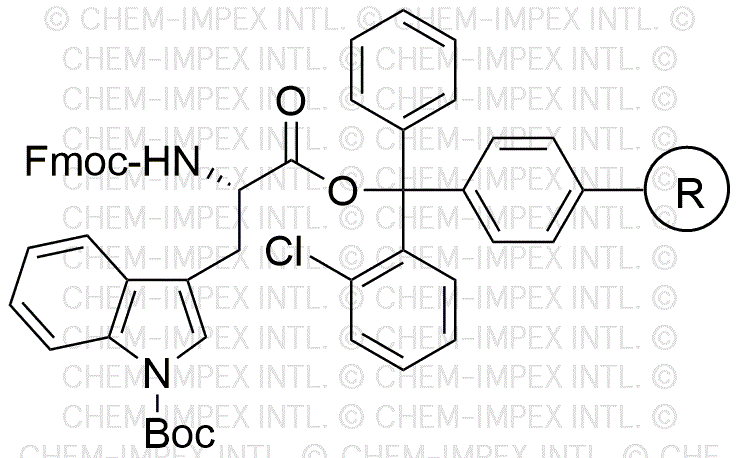Fmoc-L-Trp(Boc)-2-chlorotrityl resin is widely utilized in research focused on:
- Peptide Synthesis: This resin is essential for solid-phase peptide synthesis, allowing researchers to efficiently create complex peptides with high purity and yield.
- Drug Development: In pharmaceutical research, it aids in the development of peptide-based drugs, providing a reliable method for creating potential therapeutic agents.
- Bioconjugation: The resin can be used to attach peptides to various biomolecules, facilitating the study of protein interactions and the development of targeted therapies.
- Research in Cancer Therapeutics: It plays a crucial role in synthesizing peptides that can be used in cancer treatment research, helping to identify new therapeutic targets.
- Custom Peptide Libraries: This resin supports the creation of diverse peptide libraries for screening and discovery, enabling researchers to explore a wide range of biological activities.
General Information
Properties
Safety and Regulations
Applications
Fmoc-L-Trp(Boc)-2-chlorotrityl resin is widely utilized in research focused on:
- Peptide Synthesis: This resin is essential for solid-phase peptide synthesis, allowing researchers to efficiently create complex peptides with high purity and yield.
- Drug Development: In pharmaceutical research, it aids in the development of peptide-based drugs, providing a reliable method for creating potential therapeutic agents.
- Bioconjugation: The resin can be used to attach peptides to various biomolecules, facilitating the study of protein interactions and the development of targeted therapies.
- Research in Cancer Therapeutics: It plays a crucial role in synthesizing peptides that can be used in cancer treatment research, helping to identify new therapeutic targets.
- Custom Peptide Libraries: This resin supports the creation of diverse peptide libraries for screening and discovery, enabling researchers to explore a wide range of biological activities.
Documents
Safety Data Sheets (SDS)
The SDS provides comprehensive safety information on handling, storage, and disposal of the product.
Product Specification (PS)
The PS provides a comprehensive breakdown of the product’s properties, including chemical composition, physical state, purity, and storage requirements. It also details acceptable quality ranges and the product's intended applications.
Certificates of Analysis (COA)
Search for Certificates of Analysis (COA) by entering the products Lot Number. Lot and Batch Numbers can be found on a product’s label following the words ‘Lot’ or ‘Batch’.
*Catalog Number
*Lot Number
Certificates Of Origin (COO)
This COO confirms the country where the product was manufactured, and also details the materials and components used in it and whether it is derived from natural, synthetic, or other specific sources. This certificate may be required for customs, trade, and regulatory compliance.
*Catalog Number
*Lot Number
Safety Data Sheets (SDS)
The SDS provides comprehensive safety information on handling, storage, and disposal of the product.
DownloadProduct Specification (PS)
The PS provides a comprehensive breakdown of the product’s properties, including chemical composition, physical state, purity, and storage requirements. It also details acceptable quality ranges and the product's intended applications.
DownloadCertificates of Analysis (COA)
Search for Certificates of Analysis (COA) by entering the products Lot Number. Lot and Batch Numbers can be found on a product’s label following the words ‘Lot’ or ‘Batch’.
*Catalog Number
*Lot Number
Certificates Of Origin (COO)
This COO confirms the country where the product was manufactured, and also details the materials and components used in it and whether it is derived from natural, synthetic, or other specific sources. This certificate may be required for customs, trade, and regulatory compliance.


